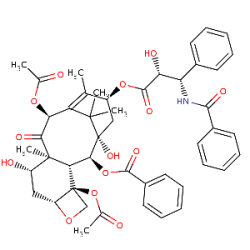Molecular Playground/Taxol
From Proteopedia
| Line 3: | Line 3: | ||
One of the [[CBI Molecules]] being studied in the [http://www.umass.edu/cbi/ University of Massachusetts Amherst Chemistry-Biology Interface Program] at UMass Amherst and on display at the [http://www.molecularplayground.org/ Molecular Playground]. | One of the [[CBI Molecules]] being studied in the [http://www.umass.edu/cbi/ University of Massachusetts Amherst Chemistry-Biology Interface Program] at UMass Amherst and on display at the [http://www.molecularplayground.org/ Molecular Playground]. | ||
| - | Paclitaxel, also called | + | Paclitaxel, also called Taxol (Bristol-Myers Squibb), is a plant derived anticancer drug that was first isolated from the bark of Pacific yew tree, ''Taxus brevifolia'', in 1971. It is a complex diterpenoid with a bulky, fused ring system as well as a number of hydrophobic substituents. It is currently being used in the treatment of ovarian, breast and lung cancers, and additional therapies are being developed for treatment of Alzheimer's and post-heart surgery patients. Taxol causes cell death by promoting the assembly of microtubules, preventing cell mitosis. |
| + | |||
| + | Originally, paclitaxel was produced through the extraction of the drug from the bark of ''Taxus'' trees. This process was unsustainable because nearly 40,000 trees were required to meet the demands for the drug each year. A semi-synthetic route was developed which utilized Taxol precursors which can be extracted from the needles of ''Taxus'' trees. | ||
Presently, taxol supply is made available either through a semi-synthetic route using precursors isolated from needles of yew species or through ''Taxus'' cell suspension cultures. ''Taxus'' cell suspension culture is an alternative to stripping bark from ''Taxus'' trees and extracting precursors from needles. | Presently, taxol supply is made available either through a semi-synthetic route using precursors isolated from needles of yew species or through ''Taxus'' cell suspension cultures. ''Taxus'' cell suspension culture is an alternative to stripping bark from ''Taxus'' trees and extracting precursors from needles. | ||
Revision as of 14:36, 10 December 2010
One of the CBI Molecules being studied in the University of Massachusetts Amherst Chemistry-Biology Interface Program at UMass Amherst and on display at the Molecular Playground.
Paclitaxel, also called Taxol (Bristol-Myers Squibb), is a plant derived anticancer drug that was first isolated from the bark of Pacific yew tree, Taxus brevifolia, in 1971. It is a complex diterpenoid with a bulky, fused ring system as well as a number of hydrophobic substituents. It is currently being used in the treatment of ovarian, breast and lung cancers, and additional therapies are being developed for treatment of Alzheimer's and post-heart surgery patients. Taxol causes cell death by promoting the assembly of microtubules, preventing cell mitosis.
Originally, paclitaxel was produced through the extraction of the drug from the bark of Taxus trees. This process was unsustainable because nearly 40,000 trees were required to meet the demands for the drug each year. A semi-synthetic route was developed which utilized Taxol precursors which can be extracted from the needles of Taxus trees.
Presently, taxol supply is made available either through a semi-synthetic route using precursors isolated from needles of yew species or through Taxus cell suspension cultures. Taxus cell suspension culture is an alternative to stripping bark from Taxus trees and extracting precursors from needles.
|
Molecular Playground Banner: "Paclitaxel (Taxol),a plant-derived natural product to treat cancer"
Proteopedia Page Contributors and Editors (what is this?)
Sarah Wilson, Alexander Berchansky, Rohan Patil, Elizabeth Cummings, Michal Harel, Lynmarie K Thompson

